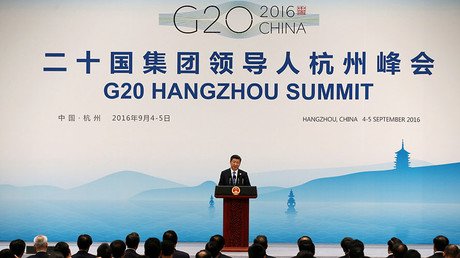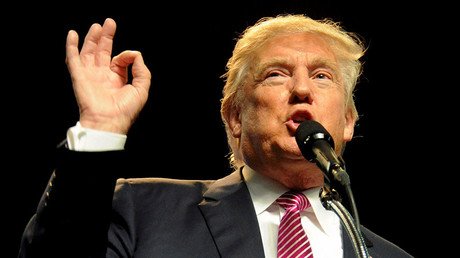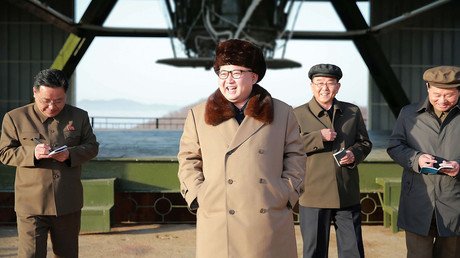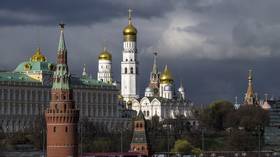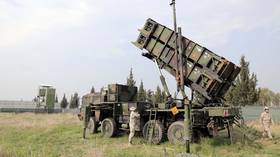Wall Street: The Trump-China missing link
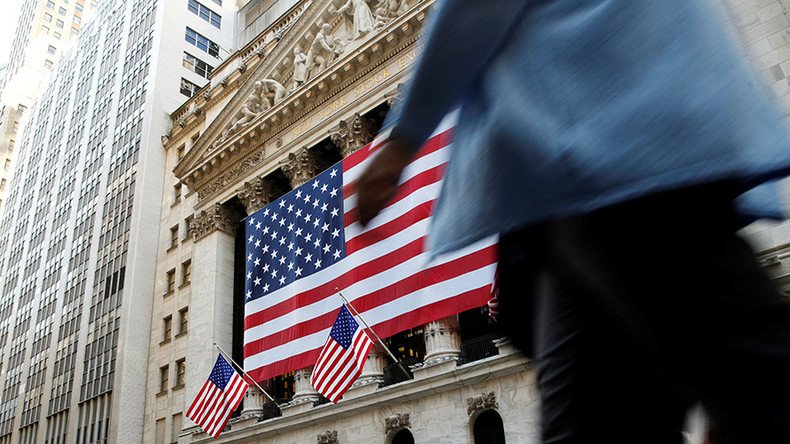
The yuan is about to enter the IMF’s basket of reserve currencies this coming Saturday - alongside the US dollar, pound, euro and yen. This is no less than a geoeconomic earthquake.
Not only does this represent yet another step in China’s irresistible path towards economic primacy; the Chinese currency’s inclusion in the Special Drawing Rights (SDR) basket will also lead central banks and hyper-wealthy funds – especially from the US – to increasingly buy more Chinese assets.
At the first US presidential debate, Donald Trump took no prisoners, criticizing China’s currency manipulation. This is what he said:
“You look at what China’s doing to our country in terms of making our product, they’re devaluing their currency and there’s nobody in our government to fight them… They’re using our country as a piggy bank to rebuild China, and many other countries are doing the same thing.”
Well, China is not “making our product”; the manufacturing process is Made in China – then exported to the US. Most of the profits benefit US corporations – everything from design, licensing and royalties to advertising, financing and retail margins. If the mantras manage to spell out a partial truth - the US has lost manufacturing jobs to China, China is the “factory of the world” – they don't spell out the hidden truth that those who profit are essentially major corporations.
China does not “devalue their currency”; the People’s Bank of China periodically adjusts the yuan according to a very narrow band. The major practitioners of quantitative easing (QE) are actually the US, as well as Japan and the European Central Bank (ECB). And the currency of global consumer goods manufacturing continues to be the US dollar, not the yuan.
Beijing also is not “using our country as a piggy bank to rebuild China.” This is all about balance of payments. What US consumers spend on Made in China products – many of them delocalized by US corporations – is pumped back to the US as capital inflows that keep interest rates down and help to support the Empire of Chaos’s global hegemony.
Win-win, Wall Street-style
Trump’s attention span is notoriously minimalist. If his advisers managed to imprint – tweet? - a few one-liners on his brain, he would be able to explain to US public opinion how the US-China game is really played, something that all relevant parties in both nations know by heart.
And the – crucial - missing link in the whole game is Wall Street.
This is how it works. A mighty hedge fund approaches a US corporation and/or large company with “an offer you can’t refuse”: Delocalize to China. This necessarily implies that all the company’s assets are re-hypothecated on a double-entry ledger in Wall Street.
Wall Street “wins” both ways; either by financing the delocalization (and corresponding US job extinction) to China, or buying companies that refuse to delocalize.
Then they go for wage arbitrage concerning products that used to be Made in USA and are now Made in China; that concerns the huge wage gap between the US and China, which also factors the exchange rate between the US dollar and the yuan.
China for their part recycles their US dollars buying US Treasury Bills. This, of course, holds bond prices high, and that helps to keep US interest rates low.
Everything in fact is on a high; bond prices, the US dollar perceived value all over the world, the exchange rate. US dollars keep frantically entering the US economy, then – in theory - used to keep frantically buying Made in China products.
Of course the price of a Made in China product in the US is low – and that is “incentive” enough for US companies to essentially keep Main Street USA unemployed. As Steve Jobs once famously proclaimed, “these jobs are not coming back”.
The US dollar exchange rate will continue to be high as long as China – and others - recycle their excess US dollars to buy US Treasury Bills en masse. The crucial point is that these US dollars never enter the real economy. They are sort of “trapped” either in the extremely cozy upper strata of Wall Street casino capitalism or Too Big To Fail rarefied banking. And the Fed wants the game to go on indefinitely, to prevent a rate collapse.
Beijing for its part plays the game with relish; as the prime global export powerhouse, the agenda is to solidify – and expand - manufacturing know how on the way to achieve a status of “moderate income” nation by the start of the next decade.
The bottom line is that to recover US manufacturing jobs – as Trump has been forcefully promising – he will have to stare down the whole Wall Street finance oligarchy.
So no wonder these oligarchs – responsible for shipping all those US manufacturing jobs to Asia and lavishly profiting from bailouts to the 'Too Big To Fail' racket – hate him with all their golden-plated guts.
Hellfiring those Too Big to Fail
For all his incapacity to formulate thoughts above the language skills of a third grader, Trump has been piling up astonishing proposals that resonate wildly, way beyond the “basket of deplorables” spectrum.
He is against Cold War 2.0 and the pivot to Asia, when he says “wouldn’t it be nice to get along with Russia and China for a change?”
He no less than pre-empted WWIII when he said he would be against a US nuclear first-strike.
He totally abhors global “free trade” – from NAFTA to TPP and TTIP - because it has “hollowed out the lives of American workers”, as US corporations (under Wall Street’s “incentive”) delocalize and then import back into the US tariff-free.
Trump was even open to nationalizing Wall Street banks after the 2008 financial crisis.
So we’re faced with the ultimate surrealist spectacle of a billionaire denouncing corporate globalization, which has been responsible for stripping the US lower middle classes of countless, decent blue-collar jobs and social benefits – not to mention turning them into hostages of rotting public infrastructure. And all that with absolutely no one among the US establishment condemning the most astonishing wealth transfer to the 0.0001% in history.
If in the next two presidential debates Trump points to the crucial missing link in the whole plot – Wall Street - he might as well lock on as a surefire winner.
The statements, views and opinions expressed in this column are solely those of the author and do not necessarily represent those of RT.

